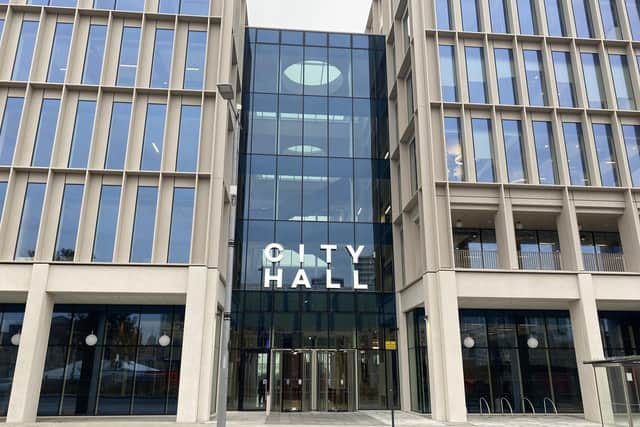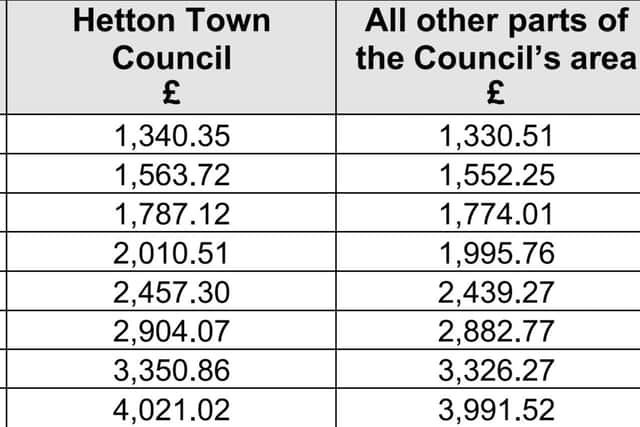Council tax rise, service cuts and spending plans for Sunderland approved
and live on Freeview channel 276
The amount Wearsiders pay in council tax and how the city’s budget will be spent have been voted through by councillors.
Sunderland City Council has signed off its latest budget plans, including another council tax rise and millions of pounds of savings.
Advertisement
Hide AdAdvertisement
Hide AdCity councillors, at a meeting this week, voted to approve a budget which includes a council tax rise of 4.99 per cent from April, 2024.


This is made up of a 2.99 per cent rise in core council tax for day-to-day council services and a two per cent government levy earmarked for adult social care services in the city.
As part of the 2024/25 budget, the council is expected to make savings of £6.673million and to use £9million of reserves to balance the books, with even more savings expected in future.
Spending commitments for next year fall against a backdrop of budget pressures around pay awards, energy, contract inflation, the cost-of-living crisis and adult and children’s social care.
Advertisement
Hide AdAdvertisement
Hide AdNext year’s council tax rise for council services includes an increase of £1.05 per week for a Band A property, which represents the majority of Sunderland households, and a rise of £1.57 per week for an average Band D property.


The budget plan and council tax changes were part of a budget proposed by the council’s Labour Group at a meeting on February 28, 2024, at City Hall.
Advertisement
Hide AdAdvertisement
Hide AdSpeaking at Wednesday’s budget meeting, Cllr Miller said “difficult decisions” had to be made to deliver a balanced budget, which was exacerbated by “crippling” government funding cuts since 2010.
The council leader added the local authority faced another “challenging year” due to cost pressures and previous cuts, with all services “feeling the squeeze”.
Cllr Miller said: “We have worked very hard to ensure this is a positive budget which allows us to continue with our ambitious social and economic regeneration plans for the city, whilst ensuring we continue to protect and support our residents most in need”.
Councillor Paul Stewart, Labour cabinet secretary, said challenges around local government funding cuts were a cross-party issue, noting the dozen councils which have issued section 114 (bankruptcy) notices since 2018.
Advertisement
Hide AdAdvertisement
Hide AdFinal council tax bills on Wearside include charges levied on behalf of Tyne and Wear Fire and Rescue Authority and the Northumbria Police and Crime Commissioner, with both ‘precepts’ increasing this year.
Residents living within the Hetton Town Council parish area would also see a precept added to their council tax bill.
A report to councillors said the Sunderland City Council council tax rise aimed to “prevent further cuts to front line services, enable some essential investment in key priorities and minimise the use of reserves”.
Cllr Miller added Sunderland’s council tax rate would remain the lowest in Tyne and Wear and the wider North East region.
Advertisement
Hide AdAdvertisement
Hide AdThe revenue budget for 2024/25 is in line with the council’s City Plan for a more dynamic, healthy, vibrant and connected Sunderland, alongside providing assistance for residents with the cost-of-living crisis.
It includes continued investment into communities, carbon reduction, the Port of Sunderland, recycling and waste collection, street lighting and parks and an extra £21million for children’s and adult services.
Additionally, it covers spending on civic buildings, museums, sports and leisure facilities, public health, transport infrastructure, housing and more.
Advertisement
Hide AdAdvertisement
Hide AdRevenue savings proposals are understood to include staffing reviews where vacant posts are not filled and increased income in some areas, plus reviews of fees and charges, and reductions in some service expenditure.
During the budget meeting, amendments to the Labour Group budget were submitted by the city council’s Conservative and Liberal Democrat opposition groups.
The Conservative Group proposed savings of around £3.346million from the council’s day-to-day revenue budget through a range of measures.
Examples ranged from reallocating neighbourhood funds and reducing funding for communications, carbon reduction and events, to cutting councillors’ allowances, reducing trade union facility time and ending chauffeur-driven cars for senior councillors.
Advertisement
Hide AdAdvertisement
Hide AdThe Conservatives said they would redirect funding to reduce the Labour Group’s council tax increase alongside proposals to return ‘Free After 3’ parking across the city centre and introduce it at the seafront at Seaburn and Roker.
Other suggestions included making community parking permits free, introducing 10 School Streets schemes and 100 new bins across the city, along with 15 new civil enforcement officers, more park and cemetery wardens and an ‘Air Show sponsorship manager’.
They also proposed “deleting” the remaining capital budget for the F-Pit redevelopment in Washington to save £4.3million, and reallocating the cash towards a range of new initiatives.
This included new traffic lights at the Ettrick Grove/Durham Road junction, a new play park at Howick Park, around £1.3million towards a city “road and pavement repair fund”, and funds towards upgrading Fulwell War Memorial and replacing railings and hanging baskets at Roker Avenue.
Advertisement
Hide AdAdvertisement
Hide AdCouncillor Antony Mullen, leader of the Conservative Group, said the amendment “reflected the priorities that local Conservative councillors have identified in speaking to the people of our city”.
Meanwhile, the Liberal Democrats proposed to save £2.7million from the council’s day-to-day revenue budget through means such as reducing the number of council area committees from five to three and cutting expenses and special responsibility allowances for councillors.
Other savings included removing the council’s corporate communications and carbon reduction budgets, introducing a “full paperless system” for meeting documents, ending the use of council vehicles for the Mayor, cabinet and councillors, stopping funding and sponsorship for award ceremonies, scrapping the council’s foreign travel and hospitality budgets and more.
The amendment proposed using savings to reduce Labour’s proposed council tax rise by 1.6 per cent, and to allocate funding for five additional dog wardens and to reverse increases in allotment rent and brown bin charges, as well as other proposals.
Advertisement
Hide AdAdvertisement
Hide AdThis included reinstating Free After 3 in all city car parks it applied to, and introducing it at the new Riverside multi-storey car park, as well as hiring two full-time traffic wardens dedicated to Durham Road, Chester Road and Hylton Road.
Lib Dems also proposed realigning around £4.49 million in capital funding, including £4.3million allocated for Washington F-Pit and Albany park improvements, and reinvesting this into both neighbourhood and city-wide initiatives.
Examples included funds to repair roads and footpaths, a study into creating new dog parks, buying and redeveloping the Wear Tavern in Pallion for housing and commercial use and other local transport and infrastructure schemes.
Councillor Paul Edgeworth, leader of the Wearside Liberal Democrats, said the proposals were a “balanced and sensible amendment delivering common sense changes”.
Advertisement
Hide AdAdvertisement
Hide AdHowever, Cllr Miller responded by defending the Labour Group’s budget and noting that Washington and the Coalfields were “missing in action” in both opposition budgets.
The council leader added the council’s corporate communications budget was staying, that residents wanted consultation, social media updates and newsletters and that, subject to funding, he would invest more into this area.
Following debate, both opposition budget amendments failed to win support across the council chamber.
The Labour Group’s budget was eventually approved by 42 votes in favour and 22 against.